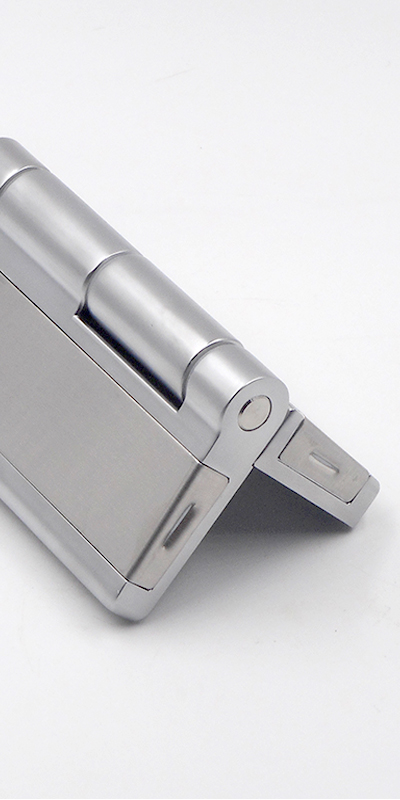Customized piano hinges in multiple sizes
IHINGES is a professional manufacturer of industrial hinges. One of our main products is the industrial-grade piano hinge.
Customizable lengths ranging from 200mm to 4000mm are available, as well as customizable widths from 15mm to 200mm. We also offer a variety of thickness options, ranging from 0.5mm to 4.0mm. You can also choose from different materials, such as copper, iron, aluminum, 201 stainless steel, 304 stainless steel, and 316 stainless steel.
Piano Hinges
IHINGES is an industrial hinge manufacturer from China. Regarding piano hinges, we can provide customized services for all sizes. Below are a few regular piano hinge specifications. If the following specifications don’t work for you, feel completely free to customize your specifications with us at any time.
Piano Hinge Specification Sheet

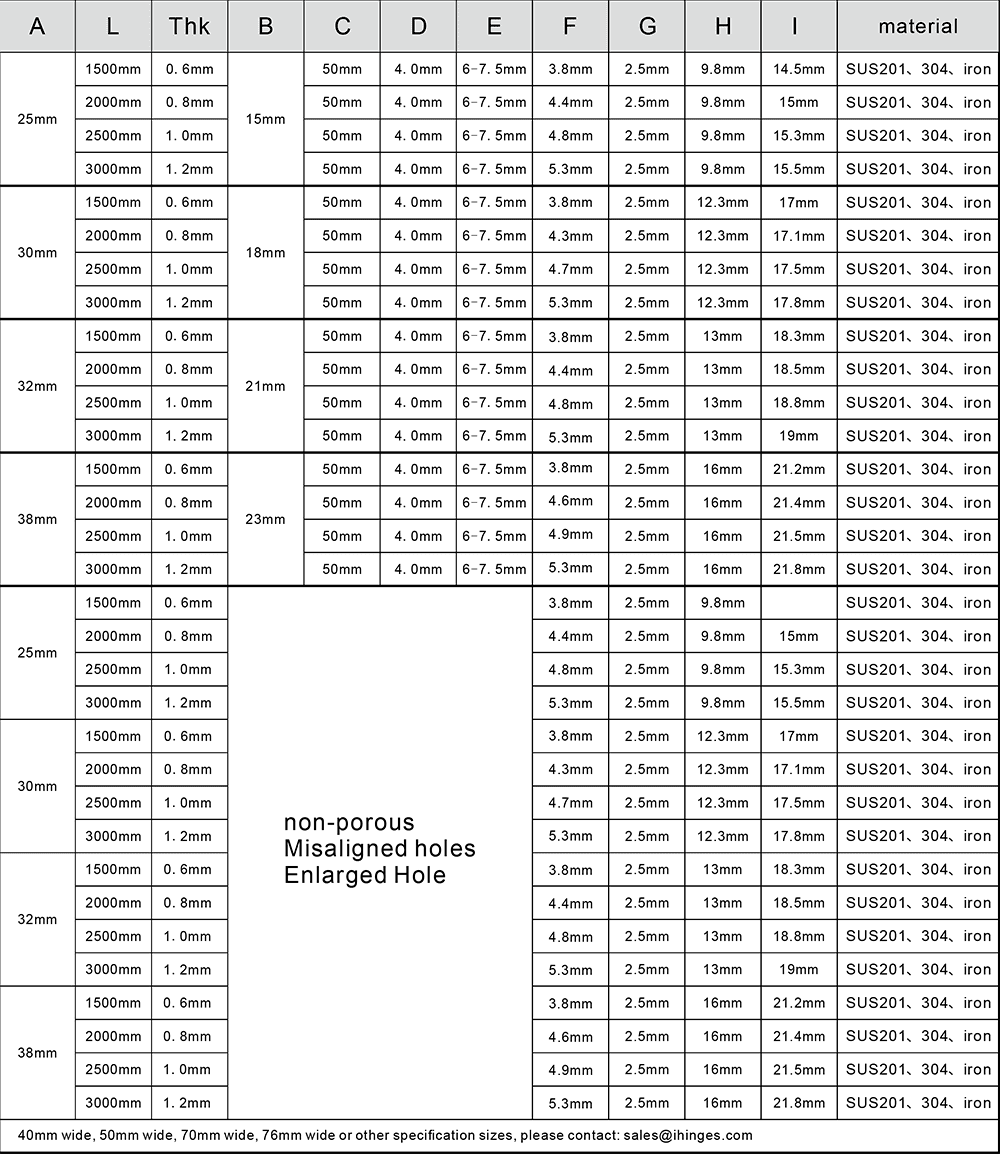
Customizing piano hinges is easy!
Basically you just need to tell us the 5 parameters of length, width, thickness and material to customize piano hinges for you. Of course you can provide more detailed data, such as whether you need to punch the holes. What is the distance between the holes and other requirements. If the hinge structure has special requirements, you can provide the relevant drawings, we can customize the production according to the drawings you provide.
- Your information are secure and confidential.
All You Need to Know About Piano Hinges
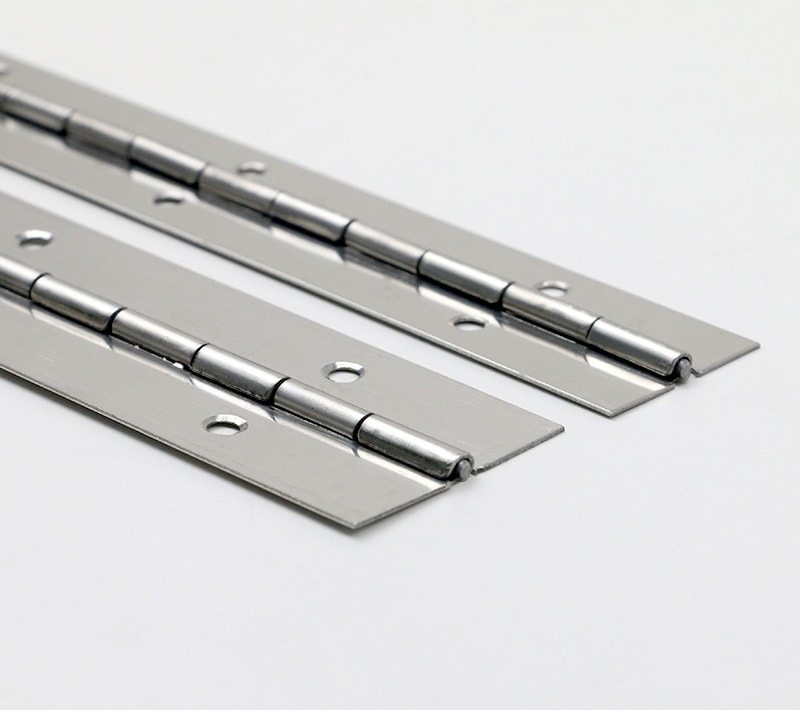
A piano hinge, also known as a continuous hinge, is a long hinge that runs the entire length of two surfaces to which it is joined, providing a robust connection. They’re named ‘piano hinges’ because they’re often used on pianos to support the heavy lid.
Made of a variety of materials like steel, stainless steel, or brass, piano hinges are highly durable and versatile, which makes them suitable for both light and heavy-duty applications, from small boxes and doors to large cabinets and industrial installations.
In terms of their structure, piano hinges are typically made of two metal leaves connected by a long pin running through their lengths. The leaves interlock with knuckles, providing the pivot for the rotation. This design evenly distributes load and stress along the hinge’s entire length, enhancing the strength and reliability of the hinge.
One key benefit of piano hinges is their ability to be cut to any desired length, which makes them incredibly flexible for a wide variety of applications.
What are Piano Hinges Used For?
- Pianos
As the name suggests, piano hinges are frequently used on pianos to support the weight of the heavy lid, allowing it to open and close smoothly.
- Doors
They’re used on full-length doors, such as on cupboards, cabinets, and wardrobes, as they provide strong and reliable support over the door’s full height.
- Industrial Applications
In the manufacturing sector, they’re often used in machinery or equipment that requires a robust hinge system, such as large storage boxes, heavy-duty doors, and safety gates.
- Vehicles
Piano hinges are commonly found in automobiles and aircraft, where they’re used in doors, compartments, and storage units due to their strength and durability.
- Marine Applications
Given their corrosion resistance (especially when made from stainless steel), they are ideal for use in boats and yachts, such as for hatches, deck cabinets, and other fixtures.
- Furniture
Beyond cabinetry, piano hinges are also used in other furniture pieces such as tables, beds, and foldable furniture where a long and sturdy hinge is required.
- Electronics Enclosures
Piano hinges are often used on the doors of large, industrial electronic enclosures due to their strength and durability.
- Tool Boxes and Chests
Due to their ability to evenly distribute weight, they’re perfect for heavy-duty applications like tool boxes and chests.
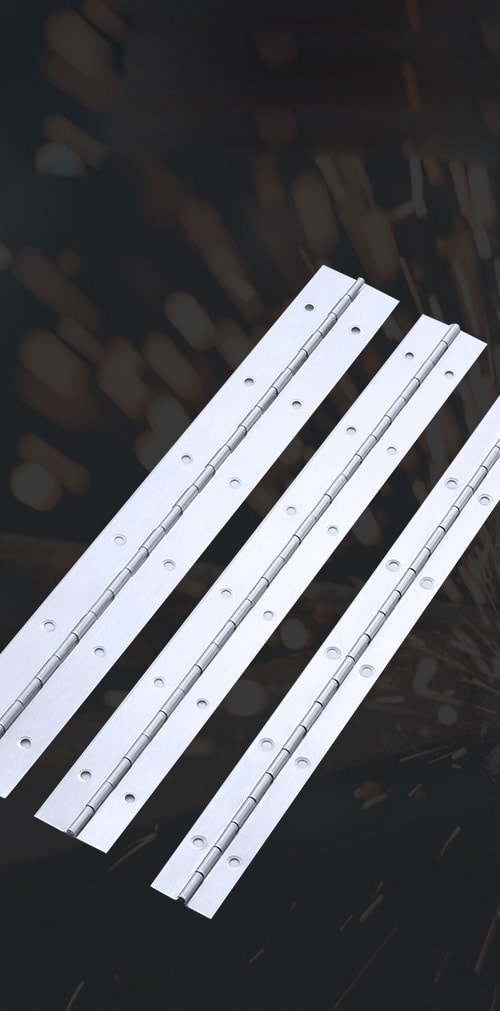
How does piano hinges work?
Piano hinges function through a long, continuous strip of metal with evenly spaced knuckles that extend along the entire length of the hinge. This design allows the hinge to offer consistent support and stability along the entire connected surfaces.
When installed, the piano hinge facilitates smooth rotation, enabling the two objects it joins (such as a piano lid and body) to open and close seamlessly. The hinge’s robust construction and load-bearing capacity make it an ideal choice for applications where durability and even weight distribution are essential, like piano lids, doors, and folding panels.
In summary, piano hinges work by utilizing a long strip of metal with knuckles that span its entire length, enabling smooth and even movement for connected objects.
Piano hinges in different materials
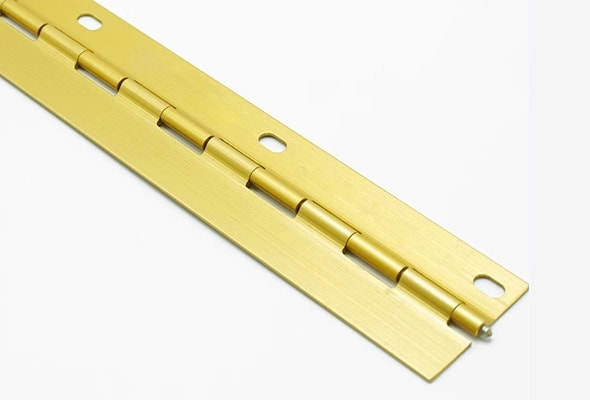
Copper Piano Hinges:
Copper piano hinges offer excellent corrosion resistance. The warm reddish-brown color of copper adds an attractive aesthetic to the product. Making it a popular choice for a variety of artistic and decorative projects in industrial environments.
In addition, copper is soft and malleable. Allowing manufacturers to create intricate and unique designs with ease. However, it is important to consider that copper may not be as strong as materials such as steel. Therefore it is best suited for applications where heavy loads and extreme pressure are not a major factor.
Iron Piano Hinges:
Iron piano hinges are a popular choice for various industrial and utility applications due to their high strength and durability. These hinges can withstand heavy-duty use and are well-suited for outdoor environments where robustness is essential.
However, it is crucial to protect them from rust and corrosion by applying coatings or proper protection. Despite this vulnerability, iron hinges remain a reliable option for industries that require sturdy and long-lasting hinge solutions. Their ability to handle heavy loads and endure tough conditions makes them a dependable choice for a wide range of industrial applications.
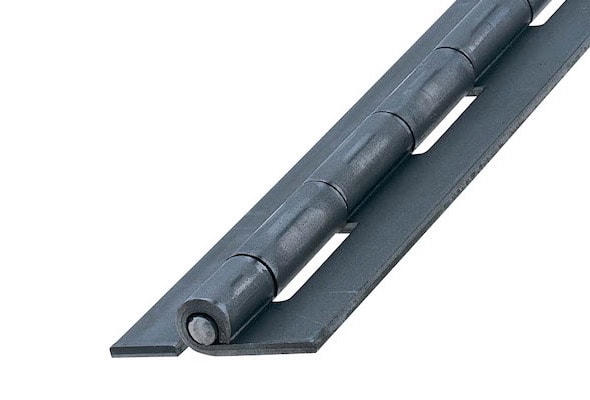
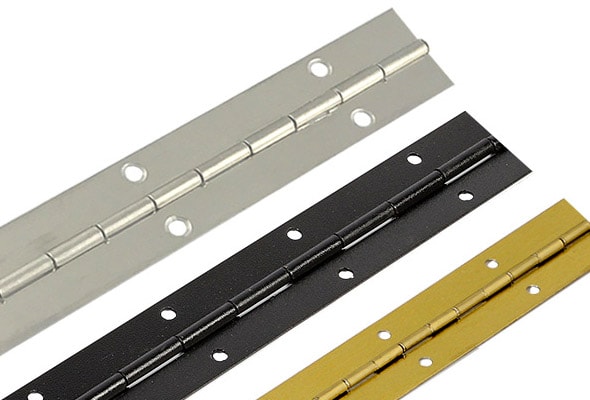
Aluminum Piano Hinges:
Aluminum piano hinges are valued for their lightweight nature and corrosion resistance, making them an excellent choice for applications where weight reduction is crucial. They find extensive use in industries such as aerospace, marine, and outdoor equipment manufacturing, where a lightweight yet durable hinge is essential.
However, it’s essential to consider that aluminum hinges may not match the strength of steel hinges, so they are best suited for applications where heavy loads and extreme stress are not predominant factors.
201 Stainless Steel Piano Hinges:
201 stainless steel piano hinges are known for their good corrosion resistance in most environments, making them a reliable choice for both indoor and outdoor applications. Compared to higher-grade stainless steel variants like 304 and 316, 201 stainless steel hinges are more affordable, making them an attractive option for cost-conscious projects.
It’s important to note that while 201 stainless steel provides decent corrosion resistance, it may not match the exceptional performance of 304 and 316 in highly corrosive or harsh conditions.
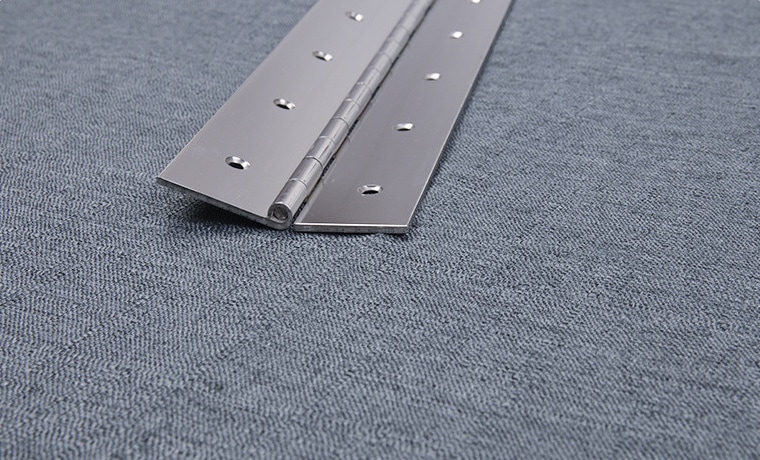
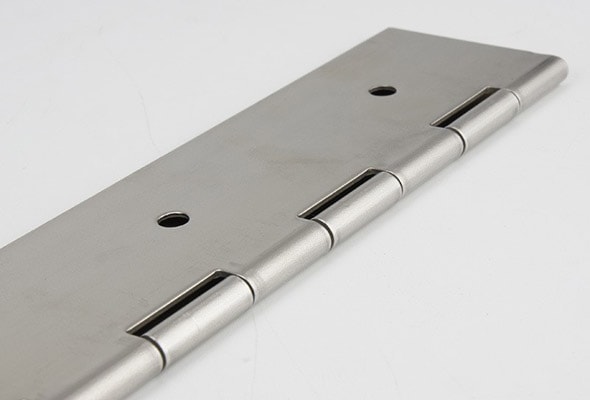
304 Stainless Steel Piano Hinges:
304 stainless steel piano hinges are highly sought after for their excellent corrosion resistance. They are a top choice for a wide range of environments. These hinges can withstand exposure to moisture, chemicals, and varying temperatures.
This makes them suitable for both indoor and outdoor applications. Beyond corrosion resistance, 304 stainless steel is favored in the food and medical industries. It is valued for its hygienic properties and ease of cleaning.Whether it’s in industrial settings, outdoor installations, or specialized industries like food and medicine, 304 stainless steel piano hinges consistently prove to be a reliable and durable solution.
316 Stainless Steel Piano Hinges:
316 stainless steel piano hinges are renowned for providing the highest level of corrosion resistance, making them ideal for use in marine and coastal environments. They excel in resisting pitting and crevice corrosion, which are common challenges in harsh or corrosive conditions.
Due to their exceptional resistance to corrosion, 316 stainless steel piano hinges are a preferred choice for applications where exposure to moisture, saltwater, and chemicals is a concern. Whether it’s in maritime industries, coastal infrastructure, or any setting requiring superior corrosion resistance, 316 stainless steel piano hinges deliver unmatched performance and longevity.
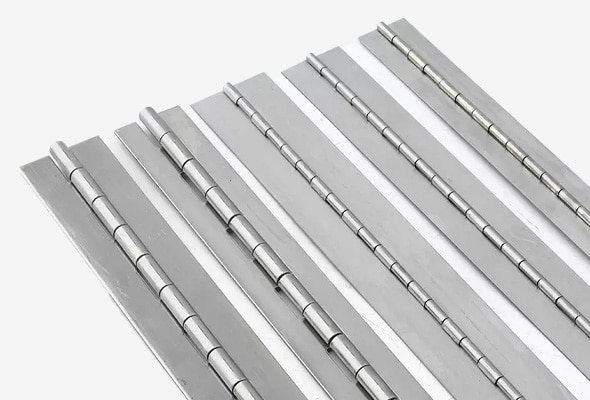
Why Choose Piano Hinges?
High Strength and Durability:
Piano hinges are renowned for their sturdy construction and durability, capable of withstanding heavy loads and frequent opening and closing.
Excellent Stability:
The design of piano hinges ensures that doors or panels remain stable during operation, avoiding wobbling or loosening.
Full Range Opening:
Piano hinges allow doors or panels to fully open within a 180-degree range, providing convenient access and usage.
Smooth Movement:
Piano hinges' design enables smooth and seamless opening and closing actions, reducing noise and friction.
Corrosion Resistance:
Stainless steel or other special coatings on piano hinges offer excellent corrosion resistance, making them suitable for various environments, including indoor and outdoor settings.
Versatile Applications:
Piano hinges find applications in a wide range of industries, including furniture, electronics, medical equipment, industrial machinery, providing durable solutions for different sectors.
Considerations When Customizing Piano Hinges
#1-Length:
The length of the hinges should be slightly shorter than the length of the door and the door panel. Usually you can set it 1cm shorter than the door and door panel at each end.
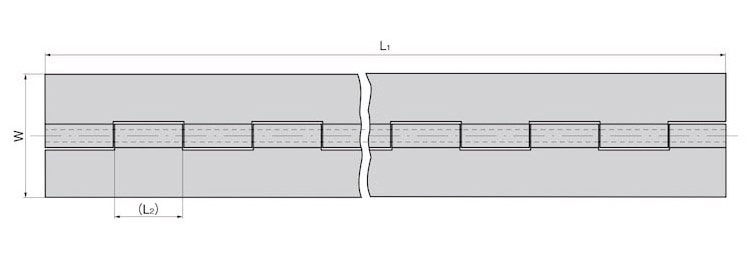
#4-Meterial:
If it is used in the sea, please use 316 material; if it is used outdoor, it is recommended to use 304 material; if it is used indoor dry environment, it can use iron, copper or aluminum material. These are not absolute, just consider the economy and choose the suitable material.
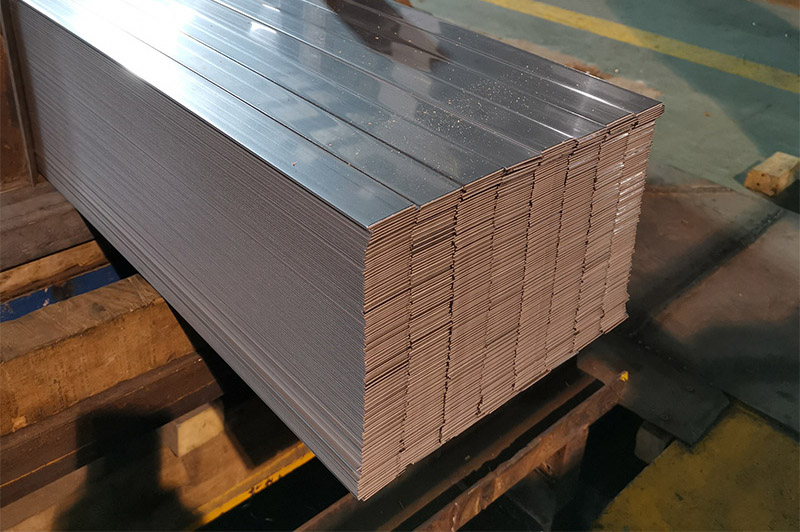
#2-width:
The width here refers to the width of the hinge after it is unfolded, as shown in the figure below. The width depends on the actual situation.
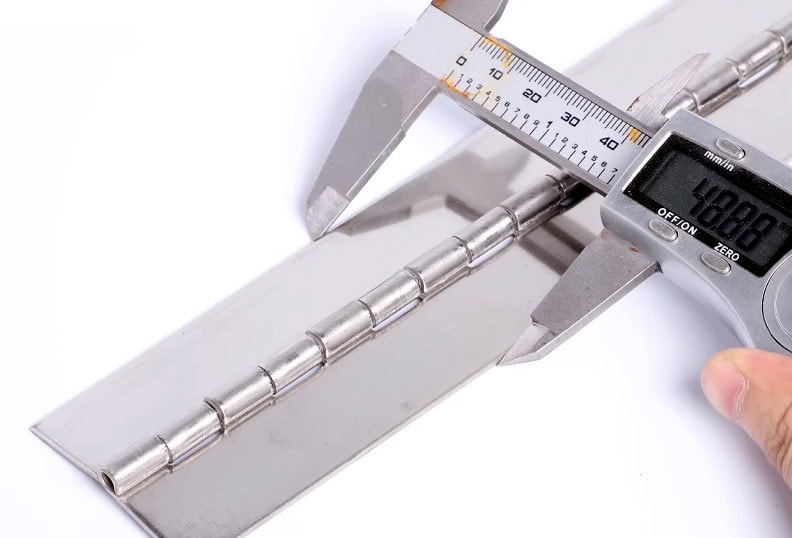
#5-Hole:
The length of the hinges should be slightly shorter than the length of the door and the door panel. Usually you can set it 1cm shorter than the door and door panel at each end.
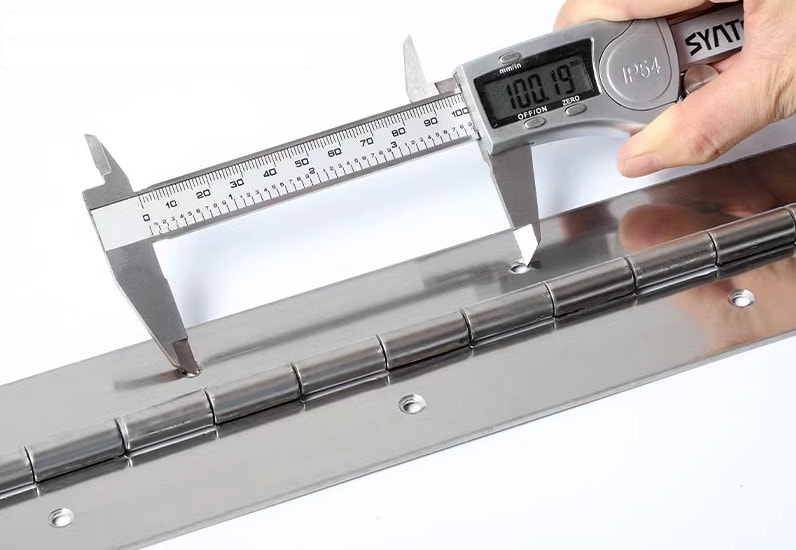
#3-thickness:
Thickness can be selected from 0.5mm~4.0mm, depending on the size of the load bearing, thickness within 2.0mm can meet most of the usage scenarios. If the load bearing is relatively large, you can consider the thickness of 2.0mm or above.
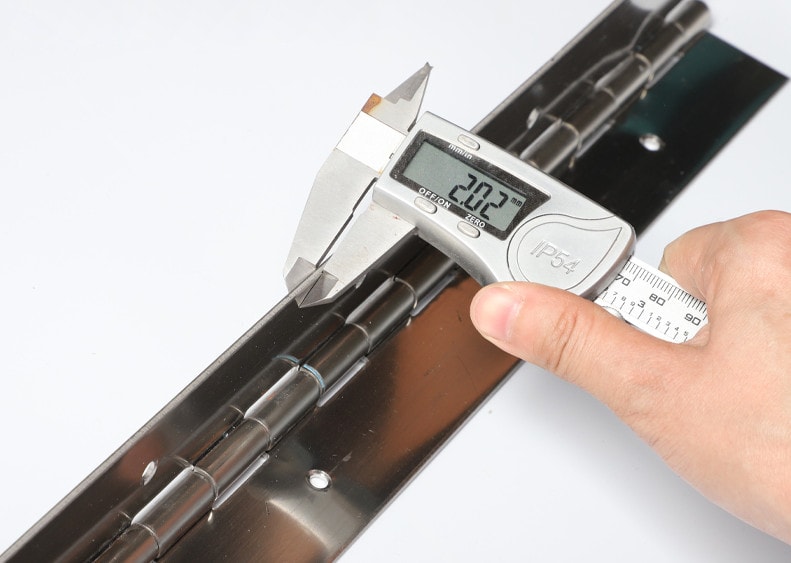
#6-Structure:
Piano hinges are usually flat in construction. You can certainly customize different structures upon request. For example, the step type.
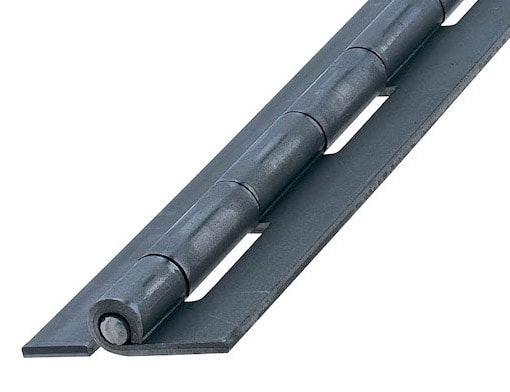
FAQ About Piano Hinges
Are you a manufacturer or a trader?
IHINGES is a manufacturer specializing in the design and production of industrial hinges. Customers only need to provide certain data and we can come up with designs and samples for them. There is no middleman.
What information do I need to provide to get a custom piano hinge made?
You’ll generally need to provide detailed specifications, including the hinge’s length, width, thickness, pin diameter, hole pattern, material type, and finish. You may also need to provide information about the application to help ensure the hinge will work correctly.
Can I specify a certain type of finish for my custom piano hinges?
Yes, IHINGES a variety of finishes for custom piano hinges. These can include plain, polished, satin, chrome plated, nickel plated, brass plated, and more. Your choice of finish can affect the hinge’s appearance, corrosion resistance, and price.
Is there a minimum order quantity for custom piano hinges?
There is no minimum order quantity. You just tell us what you need.
Can I get a piano hinge with custom hole patterns or no holes at all?
Yes, custom hole patterns or holeless piano hinges are often available. This can be useful if you have a unique installation requirement or if you want to drill the holes yourself to match existing holes.
What is the approximate lead time for orders?
Normally we will deliver within 25~30 working days.
How can I be sure that the custom piano hinge will fit my application?
To ensure a good fit, it’s important to provide accurate and detailed specifications when ordering. IHINGES offers prototyping services, allowing you to test a sample hinge before committing to a full order.
Can you assist with the design of a custom piano hinge?
We can provide design assistance, leveraging our expertise in hinge design to help ensure the best fit and function for your application. This can be especially useful if you’re not sure about the best design or specifications for your hinge.
What is the price range for custom piano hinges?
The price of custom piano hinges can vary greatly depending on the size, material, finish, and other specifications. It’s important to get a quote from us before placing an order: [email protected].
Why customize to us?
IHINGES specializes in making industrial hinges. Piano hinges are one type of hinges that we focus on producing. There are more than 20 years of experience in customization and production.
- No.10, Juyuan II Road, Shangtun, Liao Bu Town, Dongguan City, Guangdong Province, China
- +86 136 5038 7336
- [email protected]
Submit customized parameters
Send us a message if you have any questions or request a quote.

